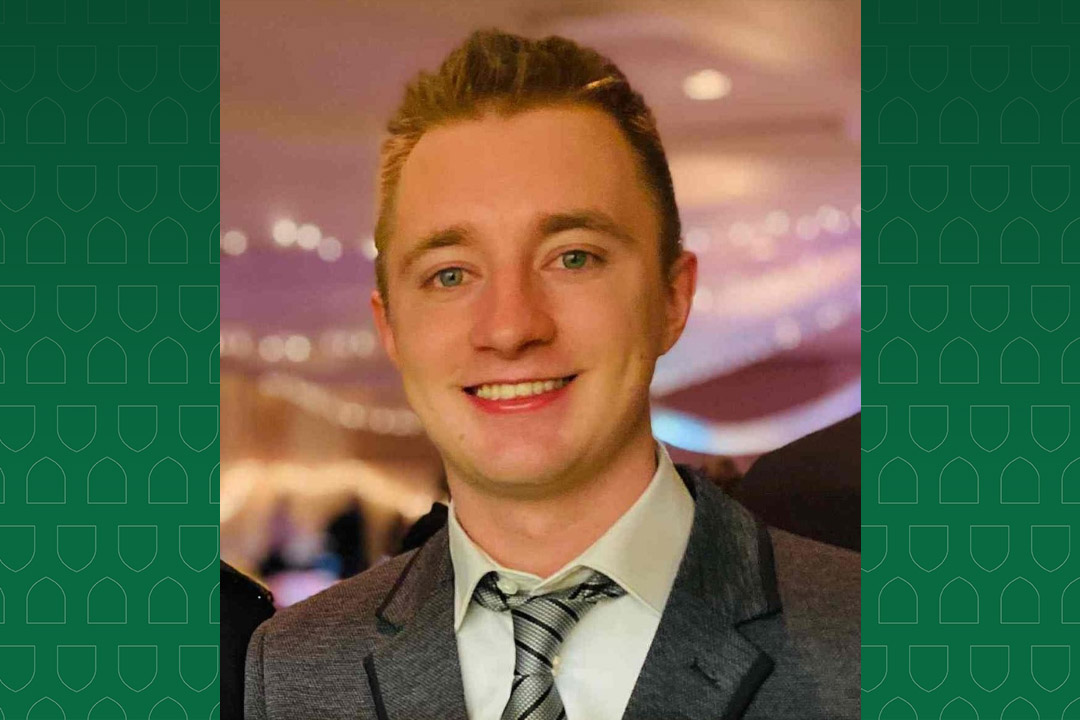
USask graduate’s research contributes to deeper understanding of mathematics behind plasmas
Jason M. Keller will receive a Master of Science degree during 2022 USask Spring Convocation in June.
By Shannon BoklaschukEver since he was a child, Jason M. Keller has enjoyed numbers, patterns and puzzles.
It’s perhaps fitting, then, that the University of Saskatchewan (USask) graduate is set to receive a Master of Science degree in mathematics during USask’s Spring Convocation in June, following the Bachelor of Science in Engineering degree he earned at the university in 2020. He credits his mentors, both in high school and at USask’s College of Arts and Science, with helping him on the road to academic success.
“Learning mathematics always felt mysterious and precious, as though you got to play with something absolutely fundamental that was always right in front of you, if you were looking for it,” he said.
Keller, who was born and raised in Unity, Sask., pursued his graduate degree under the supervision of Dr. Alexey Shevyakov (PhD) in the Department of Mathematics and Statistics. With his master’s studies now complete, Keller is looking forward to his graduation and to celebrating his achievements.
“I feel very happy with how everything turned out in the end. There is definitely a large sense of accomplishment and that sweet sense of relief once you finish everything,” he said. “However, I already find myself looking back fondly on some great moments in my classes, discussions with my supervisor and seminars with peers.”
Keller came to the department after earning his engineering physics degree with great distinction. When he pursued his bachelor’s degree, he held a competitive Undergraduate Student Research Award from the Natural Sciences and Engineering Research Council of Canada (NSERC) in the Department of Mathematics and Statistics, under the mentorship of Shevyakov. He continued under Shevyakov’s supervision for his master’s program and earned a prestigious NSERC Canada Graduate Scholarship.
As he pursued his master’s degree, Keller wrote a thesis titled Exact Equilibrium Solutions of the Magnetohydrodynamic Plasma Model. His graduate research contributes new knowledge to the field of plasma science, through enhanced models for plasma dynamics and the discovery of exact solutions to these models. His research results can be applied to problems in engineering, material science, astrophysics, nuclear physics and medicine, and his thesis has resulted in two articles that will be submitted for refereeing by top journals.
“Plasma dynamics has very rich mathematical structure due to its complexity along with a lot of open problems and areas of research,” Keller said. “It aligned with a lot of the content I really enjoyed from my applied mathematics courses.”
Dr. Steven Rayan (PhD), a faculty member in the Department of Mathematics and Statistics and the chair of Keller’s thesis examination committee, said Keller gave a spellbinding presentation as part of the thesis defence process and demonstrated broad knowledge in answering committee members’ questions.
“Jason’s work is focused on plasma, which is one of the fundamental states of matter in nature,” said Rayan, who is also the director of USask’s Centre for Quantum Topology and Its Applications (quanTA).
“This kind of matter is highly electrically charged—when you see lightning in the sky, you’re seeing plasma in action. Without plasmas, Las Vegas would be a very different place, as neon signs are a key example of how we have harnessed plasmas for everyday use. Today, plasma TVs and display panels are the successor to this kind of technology. Plasma engineering doesn’t stop here and is leading to a wide array of remarkable new technologies that are on the horizon. A better understanding of the mathematics behind plasmas is a key step in these advancements, and this is exactly what Jason accomplishes in his thesis.”
Keller’s thesis also included many high-quality colour figures that he crafted. As a result of his excellent work, the committee nominated him for both the USask master’s thesis awards and the Western Association of Graduate Schools thesis award.
When asked about his advice for success as a post-secondary student, Keller said it’s important to “always put fundamental understanding first, especially in any of the STEM (Science, Technology, Engineering and Mathematics) fields.”
“A solid understanding of the basics will help you get better grades, do more in less time and make the course more enjoyable,” he said. “So many subjects—especially in mathematics—build off the subjects before it, so you really need to understand that groundwork before you can move forward.”
With his master’s degree now complete, Keller is making plans for the future. He recently accepted an industry job at Siemens EDA, in the area of research and development.
“I am very happy with the position and am taking it as a great opportunity to hone my programming skills,” he said. “I have started studying mathematics in my leisure and am finding it very enjoyable. I am currently part of several musical groups and will be putting more time into that area of my life.”

